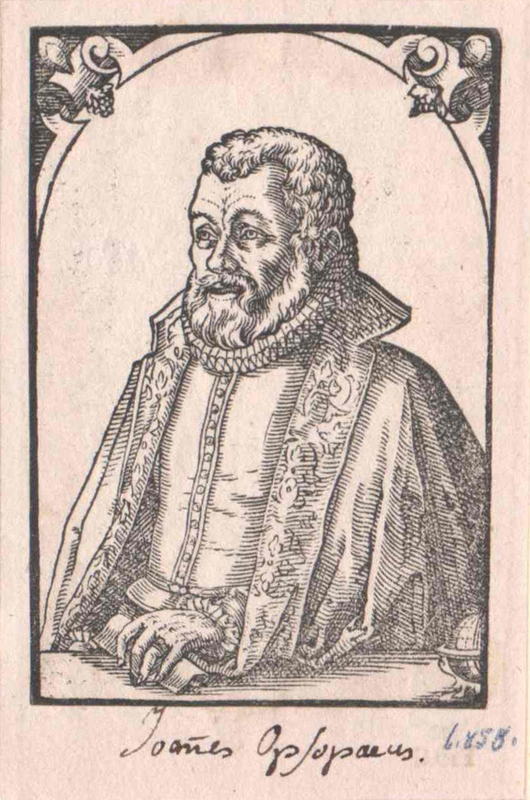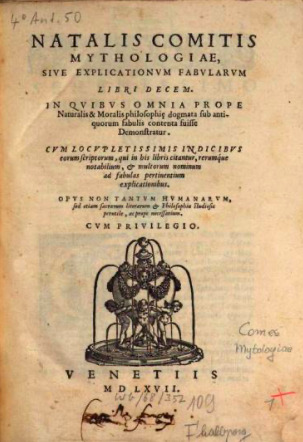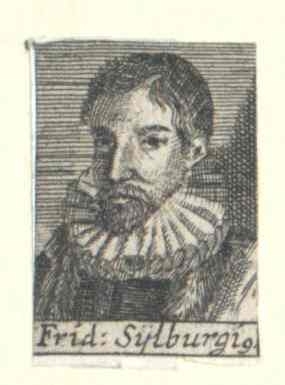Johannes Opsopoeus (1556-1596). A Bio-bibliographical Essay


Portrait of Johannes Opsopoeus
© Österreichische Nationalbibliothek Wien
Johannes Koch (“Cook”), grecized Opsopoeus, was born in 1556 in the town of Bretten, nowadays near by Karlsruhe (founded only in 1715) and especially known for being the native city of Philipp Melanchthon (1497–1560). In Bretten, Johannes’ brother Jost Koch (who died in 1591) worked as a cooper,[3] whereas his considerably younger brother Simon (1578–1619) became a professor of medicine at the University of Heidelberg in 1614, just like Johannes Opsopoeus himself.[4] After attending the reform ‘Gymnasium Illustre’ of Neuhausen near Worms, Johannes Opsopoeus went to Heidelberg in 1573 where he became a student at the ‘Collegium Sapientiae’.[5] However, in 1576 he was forced to leave Heidelberg due to his Calvinist confession and was employed by the Huguenot André Wechel (who died in 1581) as a corrector at his Frankfurt printing house, and remained there until 1578.[6]
One of Opsopoeus’ projects at the Wechel press was an edition of letters, written by Joachim Camerarius (1500–1574), a close friend of Philipp Melanchthon. It appeared in Frankfurt in 1583 (Ioachimi Camerarii Bapenbergensis Epistolarum familiarium libri VI). At this time, Opsopoeus had already been living in Paris for five years where he combined his studies and practice in medicine with philological activities. This resulted in several publications in the late 1580s, namely an edition of Hippocrates (1587) and several editions of ancient Oracles (1589/1599) that appeared in Jacques Dupuy’s Paris printing house. A number of Opsopoeus’ earlier projects – perhaps mainly based on his work in the Frankfurt years (1576–1578) – had already been published in the early 1580s by André Wechel’s and his heirs’ press: In 1580, the edition of Nicolas Cleynaerts’ Institutiones ac meditationes in graecam linguam – prepared by Friedrich Sylburg and Opsopoeus – appeared in Frankfurt. In 1581, the first Frankfurt edition of Natale Conti’s Mythologiae libri was published, its Latin parts being corrected by Opsopoeus. Wechel, in his letter to the ‘candid reader’ remarks that Opsopoeus corrected printing errors in the Venice edition, published in 1567 (a vitiis enim typographicis Latina sedulò repurgavit), as well as stylistic mistakes (praesertim suspecta loca è suis quaelibet autoribus emendavit). He also notes that Opsopoeus reorganised the index (Indice etiam in meliorem ordinem redacto).[7] Totalling 55 pages, the Frankfurt index lists firstly remarkable details (rerum memorabilium) mentioned in Conti’s Mythologia, secondly regions, cities and places, named after mythological figures (Regionum, urbium, locorumq[ue]; nomina, quae originem ceperunt à filiis variorum Deorum antiquorum), and thirdly plants and animals, dedicated to gods (Quae plantae, & quae animalia quibus Diis fuerint antiquitus consecrata). In 1583, Sylburg released an edition of Virgil’s works that was dedicated to Natale Conti and partly corrected by Opsopoeus.
Whereas the correspondence with Camerarius’ son Joachim (1534–1598) in 1582/83 proves Opsopoeus’ contribution to the making of the Epistolarum familiarum libri VI during the early 1580s,[8] it is hitherto unclear to what extent Johannes Opsopoeus stayed in contact with the Wechel company and its corrector Friedrich Sylburg after going to Paris in 1578. At any rate, it seems likely that André Wechel’s ties to Paris were a starting point of Opsopoeus’ stay abroad beginning in 1578: Wechel had to flee Paris (where he had been, among other things, the printer of the Pléiade writers in the 1550s)[9] in the course of the St. Bartholomew’s Day massacre in 1572 and subsequently established himself as a printer in Frankfurt. From here and until 1581, Wechel remained in contact with his former factory manager and successor to his Paris printing house, Denis Du Val.[10] Opsopoeus, on his part, associated in Paris with Jean Dorat and Jean-Antoine de Baïf, two members of the Pléiade, and was likewise supported in his philological studies by Claude Dupuy, Jacques-Auguste de Thou and other famous scholars.[11]
Several letters written by Opsopoeus from 1586 up to 1588 even indicate that he stayed in Paris at least until the end of October 1588,[12] while a subsequent study trip so far has only been mentioned and roughly dated by Christian Kestner in 1740. According to him, Opsopoeus worked as a physician in Paris for six years and subsequently went to England and the Netherlands (“übte sich sechs Jahr zu Paris in der Arzeneykunst, besahe hierauf Engeland und Holland”).[13] The actual circumstances of Opsopoeus’ departure from Paris can be clarified by a file stored at the Hessisches Staatsarchiv Marburg and tie in with the chronology suggested by Opsopoeus’ letters of the late 1580s. The Marburg documents concern a conflict between Johannes Opsopoeus, his travelling companion Wolf von Ende[14] and the innkeeper Hans Schlecht. In a letter, written before the 8th of April 1589, signed by Opsopoeus as well as by Wolf von Ende and adressed to Ludwig IV, Landgrave of Hesse-Marburg, Hans Schlecht is accused of having insulted and threatened them with a gun on the country road between the towns of Ernsthausen and Münchhausen (“auff halbem Weg zwischen Ernsthausen und Münchhausen abendts Zeit [...] auff freier landtstrassen”).[15] Especially notable is the sketch of Opsopoeus’ and Wolf von Ende’s travel stages. They record having studied in France, first of all in Paris, but leaving the country at the beginning of 1589 (“vor dreien Monaten ohngefehrlich”) due to a political turmoil (“tumult und [...] aufruhr”) for England, the Netherlands, Westphalia and finally Marburg:
welcher gestalt wir ein Zeit lang uns unserer studiorum und sonsten anderer gelegenheit halben in Franckreich und in sonderheit Zu Paris verhalten, daselbsten auch bis auff nechst vorgangene tumult und [word deleted] aufruhr, davon E[uer]. F[ürstliche]. G[naden]. Zweiffels ohne vorlangst werden vernommen haben, verplieben, aber da dannen und unsers leibs und lebens sicherung willen verweichen und wiederumb in Teüschland verraisen müssen, wie wir dan vor dreien Monaten ohngeferlich von Paris abgezogen, unsern weg in Engellandt genommen, und forters aus Engelland durch die Niderlande und Zum theil Westphalen vermittelst göttlicher verleihung bis anhero in E. F. G. Stadt Marpurg kommen.[16]
These remarks thus hint at the fact that Opsopoeus and Wolf von Ende – as Calvinists – feared for their lives (“unsers leibs und lebens sicherung willen”) in the context of the War of the three Henrys, the last conflict within the French Wars of Religion between the Huguenots and Catholics in the second half of the 16th century.[17] Opsopoeus’ return to Germany therefore was primarily driven by confessional conflicts that likewise affected the intellectual life in the French capital.[18]
Soon after arriving in Hesse, Opsopoeus seems to have travelled to Heidelberg where he had been trained. As early as on the 17th of May 1589,[19] he became a professor of medicine at the University of Heidelberg. In the first half of the 1590s, he held several further academic positions at Heidelberg University and published medical treatises. Tragically, in June 1596, Opsopoeus – like Friedrich Sylburg – died of the plague.
[1] Due to the scarcity of material, only basic information on Opsopoeus’ life and work are yet known. If there is no further remark, I rely on the brief outline in Wilhelm Kühlmann et al., eds., ‘Johannes Opsopoeus’, in Die Deutschen Humanisten. Dokumente zur Überlieferung der Antiken und mittelalterlichen Literatur in der Frühen Neuzeit. Abteilung I: Die Kurpfalz. Bd. 3 [...], Europa Humanistica 9 (Turnhout, 2010), 143. Additional to the bibliography of secondary literature (cf. Kühlmann et al., 144–145) I would like to hint at Jacques Jouanna, ‘Foes éditeur d’Hippocrate: deux énigmes résolues’, in Lire les médecins grecs à la renaissance. Aux origines de l’édition médicale [...], ed. Véronique Boudon-Millot and Guy Cobolet (Paris, 2004), 1–26. Jouanna reconstructs in his paper i. a. the making of Opsopoeus’ edition of Hippocrates. Opsopoeus’ pioneering editorial work on the Sibylline Oracles is sketched by Wilhelm Kühlmann, ‘Oracula Sibyllina. Zur Diskussion eines problematischen Textes bei Sixt Birck, Sebastian Castellio und dem Heidelberger Arztphilologen Johannes Opsopoeus (1556–1596). Mit Abdruck und Übersetzung der Vorrede Castellios (1546)’, in Sebastian Castellio (1515–1563) – Dissidenz und Toleranz. Beiträge zu einer internationalen Tagung auf dem Monte Verità in Ascona 2015 [...], ed. Barbara Mahlmann-Bauer, Refo500 Academic Studies 46 (Göttingen, 2018), 75–100.
[2] The digest of archival documents (cf. Kühlmann et al., 144) can be complemented by five letters to Caspar Bauhin (written from 1594 up to 1596) and two letters to Theodor Zwinger (written in 1586/1587 in Paris), stored at the University library of Basel and accessible via e-manuscripta (e-manuscripta.ch). The Bibliothèque Nationale de France in Paris keeps Valerius Colinus’ album amicorum including Opsopoeus’ entry dated from the 15th of September 1585 (https://gallica.bnf.fr/ark:/12148/btv1b85855906/f153.item) as well as Opsopoeus’ letter to an unknown recipient, written in October 1588 in Paris (https://gallica.bnf.fr/ark:/12148/btv1b10032878s/f191.item#). The archival documents in Marburg regarding Opsopoeus’ return to Germany are presented in the end of this essay.
[3] Cf. Alfons Schäfer, Geschichte der Stadt Bretten von den Anfängen bis zur Zerstörung im Jahre 1689, Oberrheinische Studien 4 (Bretten, 1977), 304.
[4] Cf. Dagmar Drüll, Heidelberger Gelehrtenlexikon. 1386–1651 (Berlin, Heidelberg, 2002), 425.
[5] For the latter cf. Eike Wolgast, ‘Das Collegium Sapientiae in Heidelberg im 16. Jahrhundert’, Zeitschrift für die Geschichte des Oberrheins 147 (1999), 303–18.
[6] For the Gymnasium of Neuhausen and the political change in the Electoral Palatinate in 1576 cf. Maximilian Bach, Friedrich Sylburg (1536-1596). A biobibliographical essay · Mythologia (eman-archives.org).
[7] Cf. André Wechel’s letter (Candido Lectori s.) at the end of Natalis Comitis Mythologiae, Sive Explicationum fabularum, Libri decem [...] (Frankfurt, 1581).
[8] Cf. Wilhelm Kühlmann and Joachim Telle, ‘Humanismus und Medizin an der Universität Heidelberg im 16. Jahrhundert’, in Semper Apertus. Sechshundert Jahre Ruprecht-Karls-Universität Heidelberg. 1386–1986. Festschrift in sechs Bänden. Bd. 1. Mittelalter und Frühe Neuzeit. 1386–1803, ed. Wilhelm Doerr (Heidelberg, 1985), 272.
[9] Cf. Geneviève Guilleminot, ‘André Wechel et La Pléiade (1555–1559)’, Australian Journal of French Studies 17, no. 1 (1980), 65–72.
[10] Cf. Ian MacIean, ‘André Wechel at Frankfurt, 1572–1581’, in Learning and the Market Place. Essays in the History of the Early Modern Book, Library of the Written Word 9 (Leiden, Boston, 2009), 167 and 172.
[11] Cf. Kühlmann et al., ‘Johannes Opsopoeus’, 249 and 253.
[12] Cf. note 2. Drüll and Kühlmann et al. on the contrary set the beginning of Opsopoeus’ trip in 1586-87 resting upon Kestner (cf. Drüll, Heidelberger Gelehrtenlexikon. 1386–1651, 424; and Kühlmann et al., ‘Johannes Opsopoeus’, 143).
[13] Christian Wilhelm Kestner, Medicinisches Gelehrten-Lexicon. Darinnen Die Leben der berühmtesten Aerzte , samt deren wichtigsten Schrifften, sonderbaresten Entdeckungen und merckwürdigsten Streitigkeiten [...] beschrieben worden [...] (Jena, 1740), 603; cf. Drüll, Heidelberger Gelehrtenlexikon. 1386–1651, 424.
[14] On Wolf von Ende and his probable death in 1614 or 1615, cf. Johann Christian von Stramberg, ‘Ende (von)’, in Allgemeine Encyklopädie der Wissenschaften und Künste [...], ed. Johann Samuel Ersch and Johann Gottfried Gruber (Leipzig, 1840), 211; as well as Alberto Schwarz, Schloss & Herrschaft Püchau im Wurzener Land, ed. Benita Goldhahn (Beucha, 2007), 23.
[15] Hessisches Staatsarchiv Marburg, Best. 17 e Nr. Ernsthausen Krs. Frankenberg 1.
[16] Hessisches Staatsarchiv Marburg, Best. 17 e Nr. Ernsthausen Krs. Frankenberg 1.
[17] For the events in Paris cf. Alfred Fierro, Histoire et Dictionnaire de Paris (Paris, 1996), 575.
[18] For Opsopoeus’ arrest in Paris at the beginning of the 1580s, likewise a result of his reform confession, cf. Kühlmann and Telle, ‘Humanismus und Medizin an der Universität Heidelberg im 16. Jahrhundert’, 272.
[19] Cf. Drüll, Heidelberger Gelehrtenlexikon. 1386–1651, 424.
Maximilian Bach
See a presentation of the 1581 edition (Francfort, André Wechel).
Read André Wechel's letter "to the candid reader".
Access the index corrected and expanded by Opsopoeus:
- Rerum memorabilium,
- Regionum, urbium, locorumq[ue]; nomina, quae originem ceperunt à filiis variorum Deorum antiquorum,
- Quae plantae, & quae animalia quibus Diis fuerint antiquitus consecrata.
Comment citer cette page
Équipe Mythologia, "Johannes Opsopoeus (1556-1596). A Bio-bibliographical Essay"Site "Natale Conti, Mythologia, 1567-1627 : un laboratoire éditorial"
Consulté le 11/01/2026 sur la plateforme EMAN
https://eman-archives.org/Mythologia/johannes-opsopoeus





